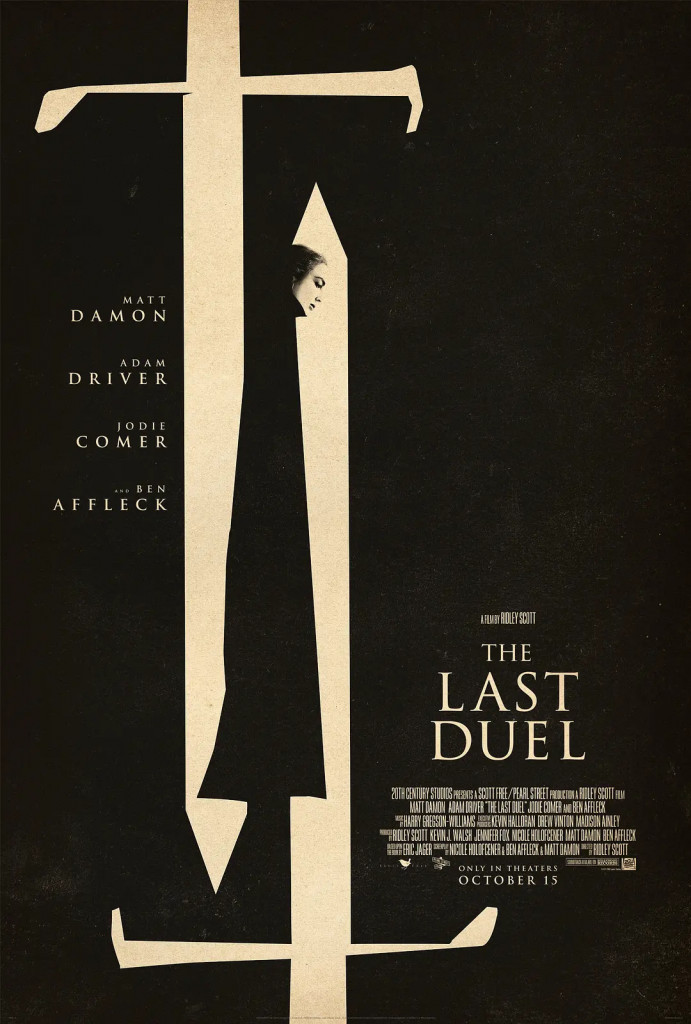Review of The Last Duel: A Belittled Feminist Masterpiece

Until we see the film’s climactic duel, which should have been tense and heart-wrenching, but I was in the same mood as Margaret, cold as death. The men on the dueling field are just fighting for their own face, the onlookers outside the dueling field are watching for the sake of curiosity and boredom, but no one looks at Margaret, in this trial about a woman’s innocence and life and death, no one cares about the emotions of the people involved.

In the opinion of many fans, the 84-year-old Ridley Scott directed the new “The Last Duel”, is a “disaster”.
After all, the film’s production costs up to $100 million, but in the worldwide box office only got more than $30 million, once again recreated Scott for “Blade Runner” in 1982 to experience the tragedy.
The last duel” in the word-of-mouth level is quite pleasing, with a Rotten Tomatoes fresh rating of 85% and a Douban rating of 8.4 points. Plus, Matt Damon and Ben Affleck teamed up again after 24 years to write and star in the film, as well as Adam Driver, Judy Comer and other big names to join, making the film’s audience is not bad.
Sometimes, we do not need to because of a masterpiece of the box office suffered a failure, it is doubtful about it, its word-of-mouth viewing experience, is the criteria for our selection of films. The Last Duel” is in this category.
Like most of Scott’s historical action films, “The Last Duel” is also based on real historical events. Only, this historical event was compiled by Eric Jager, a professor of English at UCLA, in the book “The Last Duel: The True Story of a Crime, a Scandal, and a Dueling Judge in Medieval France”.
Matt Damon read the book and was interested, so together with his friend Affleck, he adapted it into a screenplay and contacted Scott, Hollywood’s best historical action filmmaker, which led to the creation of the film.
Originally, the role of Squire Legree, played by Adam Driver, should have been played by Affleck, but Damon and Affleck took into account the familiarity of the two in the public level, in order to prevent the audience from jumping during the film, the imagination, so invited Driver to take the role. This exquisitely crafted historical film tells the story of Damon’s Carouge, Driver’s Legree, and Comer’s Marguerite.
Unlike the traditional linear narrative, “The Last Duel” is divided into three parts, from the perspective of each of the three protagonists, to sort out and observe the love-hate relationship between them. In the “confession” of Carouge (Damon), he is a fallen nobleman who has suffered a lot of grievances. He once saved Legree’s (Drever) life on the battlefield and regarded him as his brother in life and death, but the latter betrayed his trust and made repeated mischief.
Légerie first by slander to win the favor of the feudal lord Pierre (Affleck), become a high and powerful favorites, and constantly collect the taxes of Carouge; later, and then seized the succession of Carouge, promoted to the new captain. Most abominably, Legree raped Marguerite (Comer), Carouge’s wife, causing great shame to the family.
But this is not the case in Legree’s “confession”. What he remembers is that he saved Carouge’s life and put in a good word for him in front of the feudal lord Pierre, in order to prevent Carouge’s stupid brother from suffering more hostility. As for the so-called rape, it is even more ridiculous. Legree considered himself to be a talented, suave and elegant, the world’s women all worship under his armor and battle robes. Although he fell in love with Marguerite at first sight, but he also thought that Marguerite also sent him secret glances, often spread love. The two were only talking about adultery, not rape. And in Margaret’s “confession”, she was never respected by men.
Her father married herself to Karuzi for the sake of honor; her husband only cared about giving vent to his sexual desires and never cared about her feelings; it was Marguerite’s mission to have a son, otherwise she was useless in the eyes of her husband and mother-in-law; and the arrogant Legree, not only raped Marguerite, but also falsely accused afterwards, with no remorse. Karrueche, to save face, and Legree, to avoid punishment, resort to a duel to the death over Marguerite’s rape.
In the Middle Ages, when there were no surveillance cameras or DNA identification, people often decided such cases in a “duel”, believing that since God Almighty was just, he would inevitably bless the righteous side.
However, if Karrueche loses the duel, in the eyes of the people it means that Marguerite has lied and she will be burned alive in public. Isn’t it absurd that the final answer to the question of whether Marguerite was raped depends on the outcome of a brute force contest between two men.
Who will win, Carouge or Legree? And what will be the fate of Marguerite? The Last Duel” seems to be a duel of life and death, but in fact it is a depiction of the plight of medieval women.
This narrative technique in “The Last Duel” is known to many as “Rashomon”. This is a Japanese term that came to refer to the dilemma of not knowing what is true and what is not true, and the fact that each of the parties involved has a different version of the story makes it difficult to know the whole picture. Ryunosuke Akutagawa used it as an inspiration for his short story “Rashomon” in 1915.
In 1950, Akira Kurosawa combined this novel with another one, “In the Bamboo Grove,” and adapted it into the film “Rashomon. The narrative technique of “Rashomon” became common in movies and TV dramas.
But in a strict sense, “The Last Duel” does not fit all of them. Whether it’s Carrouge being called for taxes, the loss of the captain’s inheritance, or the accusation that the feudal lord Pierre and Legree have taken over the ownership of his estate, the same scenario exists in Legree’s narrative.
Further, the main plot of the film remains the same in the caliber of the three. Only in some subtle wording, vague scenes, the three narrative tone varies greatly. This narrative approach is quite similar to the 2020 Hong Kong drama “Bridge of Sighs”.
In the latter, several couples recall the same event with different attitudes and rhetoric. Each person’s memory fragment is emotionally biased towards the self, i.e. he or she is the one who gives the most and gets the least. This phenomenon of “memory bias” stems from the fact that people are centered on their own emotions and thus project more compassion and pity, while paying little attention to the emotional feedback of others.
In “The Last Duel,” both Karrueche and Legri actually save each other’s lives on the battlefield, only one after the other, which is clearly shown in the picture. However, they only remember to save each other’s lives, forgetting that they were also the saved.
This moral relationship of giving and owing has been a constant in the sixteen-year-long feud between Karruj and Legree. Karrueche considers himself constantly appropriated and insulted by Legree, while Legree feels that Karrueche is ungrateful and foolish. The two men end up in a duel to separate life and death, seemingly by chance, but inevitably.
The woman was raped is only the trigger, the man’s face is damaged, is the root of the long-standing resentment. This is what makes this film worth chewing on. On the surface, it is about the breakup between two men, but in reality, it is to reflect on the injustice suffered by women through the parochial perspective of the men.
Ridley Scott creates a historical reality in the film, but also places a ubiquitous critical perspective within this realistic context. Whether it’s a wide-angle shot of the medieval city of Paris, or a close-up shot of the velvet gown Pierre is wearing, it’s as convincing as Game of Thrones, immersing us in the palatial estate of Charles VI in the late 14th century without a hitch. In addition to this layer of visual landscape on the ultra-high degree of restoration, the above-mentioned Karrueche’s narrative perspective, Legree’s narrative perspective, but also to add a psychological dimension to this historical reality.
You won’t be disgusted with Karrueche when you watch his unitary sequences, because he’s so brave and courageous. Like the heroes in most Hollywood historical movies, you will only feel that Karrueche should be a hero against the odds, the lintel of the old times.
Likewise, you won’t feel he is brazen and self-serving when watching Legree’s unit bridge. Compared to Carouge’s innate family advantage, he is just an ordinary squire escort, in order to get ahead, he studied all kinds of knowledge, with emotional intelligence and talent in the nobility to jump up the class.
However, wait for Marguerite to tell the “truth” – the director deliberately on the screen to highlight the word “truth” for two seconds, we realize that Karrueche and Legree is so stupid! The director deliberately highlights the word “truth” on screen for two seconds, and then we realize how stupid and presumptuous Calouri and Legrand are. This contrast in narrative technique, when combined with the historical context, adds layers of male social pressure.
When Margaret responds to this awful event with the normal reaction of a woman, she is not met with fairness, but with repeated humiliation and disregard. Her best friend thinks she was raped for a “reason”; her mother-in-law thinks she is insulting her husband’s honor by denouncing justice; the clergy at the Palace of Justice bombard her with words, using malice to speculate on this poor woman.
Until we see the climax of the film at the duel, should be nervous for the heart, but I and Margaret’s mood, as cold as death. The men on the dueling field are just fighting for their own face, the onlookers outside the dueling field are watching for curiosity and boredom, but no one looked at Margaret, in this trial about a woman’s innocence and life and death, no one cares about the emotions of the people involved.
This great sense of sadness, penetrating the barrier of more than six hundred years of history, hit us hard off the screen. It makes us ask: Are women respected as a whole subject today?
Perhaps, this is also the greatest revelation that Scott, who is in his old age, leaves us in The Last Duel.
